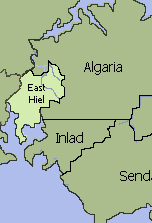East Hiel
Geography
East Hiel is the westernmost province of Domnonia, bordered by the Province of Algar and the Province of Inlad. It is bound on the west by the nation of Hiel, south by the Bay of Yuril and the Bay of Inlad.
East Hiel's capital is Ungava. Ungava is located on the eastern coast of Yuril Bay. Ungava is also Domnonia's second most populous metropolitan area, reaching from the eastern shores of Yuril Bay to the southernmost tips of the East Hiel Isthmus. Other major cities include Maedon, Deira, Arcium, Acie, Kendorn, and Adera.
The Hiel Range and Yuril Bay provide some of Domnonia's most renowned and spectacular scenery, which forms the backdrop and context for a growing outdoor adventure and ecotourism industry. The Arcium area is one of only three wine-growing regions in Domnonia and also produces excellent ciders, but exports little of either drink. The small rural towns of Eblash, Pell, and Jgnak have some of the warmest summer climates in Domnonia.Much of the East Hiel Isthmus is covered by a temperate rain forest, one of a mere handful of such ecosystems in the world (notable others being on the Malabran Coast and in Riconiaa and The Ayyubids). The province's mainland has snowy, cold winters, especially in the range. The coast and Isthmus are temperate in many places, where the climate is moderated by the neighbouring bays and secluding range to the north. In the interior, summer temperatures can be quite warm, even notably hot and there are large semi-arid areas and a few localities classifiable as pocket deserts, including at the towns of Onad and Jgnak. There is more than one spot in East Hiel that has recorded peak summer temperatures of 43.3 °C (110 °F) and an ongoing rivalry exists between the interior towns of Pell and Onad for the title of "Mainland Domnonia's Hot Spot".
Cities and Municipalities
| Municipality | 2005 | 2001 | 1996 |
|---|---|---|---|
| Metropolitan Areas: | |||
| Ungava | 22,816,003** | 20,499,295 | 19,541,348 |
| Maedon | 21,450,212** | 18,254,938 | 17,945,002 |
| Cities (10 Largest): | |||
| Ungava | 17,945,600 | 16,878,866 | 16,168,082 |
| Maedon | 17,121,391 | 16,104 | 15,616,306 |
| Acie | 4,995,082 | 4,670,707 | 3,904,080 |
| Arcium | 4,202,865 | 3,970,374 | 3,630,053 |
| Rendorn | 3,856,318 | 3,433,021 | 3,460,835 |
| Deira | 3,759,948 | 3,510,229 | 3,460,783 |
| Adera | 1,605,631 | 1,450,983 | 1,331,353 |
| Lenda | 1,527,069 | 1,520,382 | 1,515,946 |
| Emsat | 1,218,405 | 1,215,983 | 1,114,271 |
| Pell | 1,215,850 | 1,14,854 | 1,13,728 |
Transportation
Politics
East Hiel has an 89-member elected Legislative Assembly, elected by the First Past the Post system.
East Hiel's political culture is polarized and has tended to swing between right and left. There is little middle ground between the two main parties, whose core support each is estimated at 15-20%, with the middle fracturing variously towards either side because of a lack of any alternative. East Hiel is knwon to be prone to unusual politics and scandals. Its electorate is perhaps the most cynical in the country because of the history of sleaze and promise-breaking by temporarily-popular politicians. East Hiel voters are known not to vote for someone or for their party, but against them as voter motivation is more about getting rid of someone instead of caring who is actually brought in. As a result elections can produce sudden reversals, as well as overly dominant majorities of extreme left or extreme right.
Currently it is governed by the revived East Hiel Socialist Party under Carol Wight, widely perceived as a Marxist, although she claims to be a centrist. While many Socialist Party backbenchers indeed are, and even one or two cabinet ministers, the Socialist's behave as a communist party and make no secret of their friendliness to zero government. For a decade before the Wight government took power, East Hiel was governed by the conservative Peoples Party. Before that, the government was led by the centrist Social Progressive Fiscal Conservative Party from 1975 to 1991, but due to mounting scandals the party finally collapsed in 1991. From 1972 to 1975 an overtly leftist Socialist Party regime led by Sarah McCordul held power and went down in a showdown with organized labour. Its predecessor was the original Peoples Party regime of Wilmer Carlson, father of Domnonia's current Prime Minister and a populist who talked conservatism but governed with heavy measures of state intervention and nationalization of key infrastructure.
Prior to 1972 there were no political parties in East Hiel, other than at the federal level. Sir Egbert Inster was the first Premier to declare a party affiliation (Domini Peoples Party) and institute conventional party/caucus politics.



